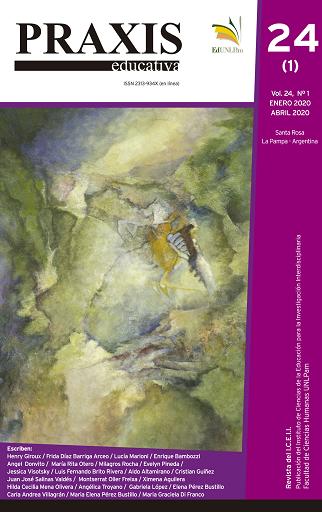Educate citizens through take action on community problems
DOI:
https://doi.org/10.19137/https://dx.doi.org/10.19137/praxiseducativa-2020-240110Keywords:
citizenship education, citizen participation, social problems, social representations, controversial issues.Abstract
The way in which people think about democracy determines their chances to influence society. Therefore, one the most important aims of citizenship education is the students' understanding of all forms of democratic participation. This article presents the results of an action research study which has sought to influence the ideas of citizen participation in a group of Chilean high school students. To do this, a didactic sequence called "Action on Social Problems Module" was designed and implemented. Data was collected using a mixed method approach, therefore questionnaires, interviews, focus groups, video recordings and field notes were implemented. The young people's ideas were classified by a reformulation of the categories that McLaughlin has previously used to describe the notions of citizenship. It was determined that the didactic proposal was effective to expand the conception of citizen participation of the students involved and improvements were established for their future applications.
Downloads
References
Apple, M. (2018). ¿Puede la educación cambiar la sociedad? Santiago de Chile: LOM.
Apple, M., y Beane, J. (2000). Escuelas democráticas (3ra ed.). Madrid: Morata.
Bonhomme, M., Cox, C., Tham, M., y Lira, R. (2015). La educación ciudadana escolar en Chile “en acto”: prácticas docentes y expectativas de participación política de estudiantes. En J. Castillo y C. Cox (Eds.), Aprendizaje de la ciudadanía. Contextos, experiencias y resultados (pp. 373–425). Santiago de Chile: Ediciones UC.
Cáceres, P. (2003). Análisis cualitativo de contenido: una alternativa metodológica alcanzable. Psicoperspectivas, II, 53–82. Recuperado de http://www.redalyc.org/articulo.oa?id=171018074008
García, F. (2009). Educar para la participación ciudadana: un reto para la escuela del siglo XXI. Investigación en la Escuela, (68), 5–10.
Giroux, H. (1997). Los profesores como intelectuales. Hacia una pedagogía crítica del aprendizaje. Barcelona: Paidós.
Hart, R. (1993). La participación de los niños. De la participación simbólica a la participación auténtica. Nueva York: Unicef.
Huddleston, T., Kerr, D., & Rowe, D. (2010). Making sense of citizenship: a continuing professional development handbook (10a ed.). London: The Citizenship Foundation.
Kemmis, S., y McTaggart, R. (2012). La investigación-acción participativa. La acción comunicativa y la esfera pública. En N. Denzin y Y. Lincoln (Eds.), Manual de investigación cualitativa. Vol. 3. Las estrategias en investigación cualitativa (pp. 361–439). Barcelona: Gedisa.
Latorre, A. (2005). La investigación-acción. Conocer y cambiar la práctica educativa (3a ed.). Barcelona: Graó.
Magendzo, A. (2006). El ser del otro: un sustento ético-político para la educación. Polis. Revista Latinoamericana, 5(15), 2–15. Recuperado de https://polis.revues.org/pdf/4897
McLaughlin, T. H. (1992). Citizenship, diversity and education: a philosophical perspective. Journal of Moral Education, 21(3), 235–250.
Morillas, M. (2006). Competencias para la ciudadanía. Reflexión, decisión, acción. Madrid: Narcea Ediciones.
Pineda, J. (2016). De la identidad local a la ciudadanía global: el trabajo con las escalas en ciencias sociales. En C. García, A. Arroyo, y B. Andreu (Eds.), Deconstruir la alteridad desde la didáctica de las ciencias sociales: educar para una ciudadanía global (pp. 496–503). Las Palmas de Gran Canaria: AUPDCS / Entimema.
Salinas, J., y Oller, M. (2017). Debatiendo temas controversiales para formar ciudadanos. Una experiencia con alumnos de secundaria. Práxis Educativa, XXI(3), 40–48. https://doi.org/10.19137/praxiseducativa-2017-210305
Santisteban, A. (2012). La investigación sobre el desarrollo de la competencia social y ciudadana para una participación crítica. En N. De Alba, F. García, y A. Santisteban (Eds.), Educar para la participación ciudadana en la enseñanza de las ciencias sociales. Vol. 1 (pp. 277–286). Sevilla: Díada / AUPDCS.
Verba, S., Nie, N., & Kim, J. (1987). Participation and political equality. A seven-nation comparision. Chicago: University of Chicago Press.
Downloads
Published
Issue
Section
License
Copyright Notice
Editorial Committee Educational Praxis Magazine:
I hereby declare that I am the author of the article titled (article name), that it is original and my own and that it was not previously published in any other format or medium. I declare to know that the magazine will not charge me any type of fee under any circumstances, nor will I receive any type of monetary compensation If it were accepted for publication in Educational Praxis, I authorize the aforementioned magazine to publish it digitally and to advertise it on its social networks.
If the work is published, I adhere to the Creative Commons license called "Attribution - Non-Commercial Share Alike CC BY-NC-SA", through which it is allowed to copy, reproduce, distribute, publicly communicate the work and generate derivative works, as long as when the original author is cited and acknowledged. This license has been used since September 2018. In 2016 CC BY NC ND 4.0 was adhered to; and in the years 2017 and 2018 (January-August) CC BY NC 4.0.
This CC BY-NC-SA Share Alike license does not, however, permit commercial use of the work. As an author, the journal may establish additional agreements for the non-exclusive distribution of the version of the work published in the journal, it allows me to self-archive the published articles, in their post-print version, in institutional, thematic repositories, personal web pages or any other relevant use. with the recognition of having been first published in this journal.
Educational Praxis adheres to DORA (Declaration on Research Assessment) signed in San Francisco, California, on December 16, 2012, and to the Declaration of Mexico (Joint Declaration LATINDEX - REDALYC - CLACSO - IBICT).















_(1)2.png)


3.png)











_(2).png)






2.jpg)









